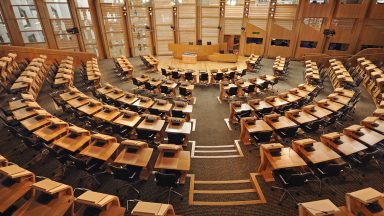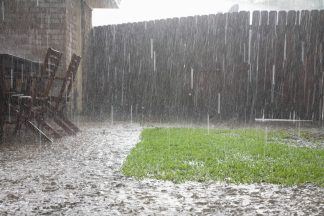The boss of the UK’s energy watchdog has said he believes billions in profits made by energy suppliers are “fair” despite households and businesses continue to struggle with soaring bills.
Energy suppliers have raked in around £30bn worth of profits from electricity and gas since 2020, according to research from the End Fuel Poverty Campaign.
But consumers are paying off £3.1bn of debt to energy companies under the price cap set by Ofgem – meaning companies can earn between one and two-and-a-half pence in the pound.
Ofgem chief Jonathan Brearley said he believes profits being made by energy suppliers are not “excessive”.
He said: “If you look at the retail market, actually profits are very low. If you look over five years, they made about a penny in the pound.
“Retail profits have been very low, near zero before the energy crisis – they are now between 1-2% of what the companies spend.
“They need to invest to make sure customer services gets better. But our job is to make sure they don’t charge more that that.
“What the price cap does is make sure customers are protected.”
When challenged on this by STV News, Mr Brearley doubled down. “They are charging what it costs, plus a small margin,” he said.
“When we look at our regulations and look at the price cap, we don’t think the retailers are making huge amounts of money.
“We need to make sure profits are fair and reasonable. It’s about a penny in the pound – up to 2.5p in the pound of the price cap.
“That, to me, is a fair reflection of what it costs to run a company.
“We don’t think profits are excessive. We make sure of that through the price cap.”
‘Like the wild, wild west’

Jonathan Brearley was speaking as he visited Equi’s ice cream factory in Rutherglen on Wednesday to discuss the energy issues that companies are facing.
Owner David Equi said the company is forking out over £20,000 a month on energy bills – £18,000 on electricity and £2,000 on gas – after being tied into a long-term contract by an energy broker in 2022.
He explained that he was “under heavy pressure” to sign after the previous supplier went bust following the war in Ukraine.
He said: “It’s very, very difficult for us. I’m probably paying £5,000-£6,000 more than I need to be, which for a business our size is significant.”
Mr Equi said he knows of many small firms roped into expensive energy contracts for years, with some even going out of business.
He said: “There’s a price cap for consumers, but not for businesses – so it was like the wild west out there. Prices were going up every day. It was just your luck when you renewed.
“The broker market is completely unregulated. It’s something I feel quite strongly about – it needs to be. It feels like dealing with double-glazing salesmen.
“It’s also not completely clear what the brokers are taking in commission.”
He added: “These long term contracts should be made null and void that were signed under pressure.”
It comes as a growing number of small businesses are complaining of vastly inflated standing charges on top of their standard energy bills, some as much as 13 times the level of three years ago.
The Federation of Small Businesses (FSB) wrote to Ofgem in April, urging it to act over fast-growing standing charges paid by small companies, particularly those in rural areas.
Standing charges are applied daily, regardless of how much energy the customer uses, and are used to cover the cost of supplying energy to homes and businesses.
They also cover the costs of building new network infrastructure and keeping the power on when energy suppliers go bust.
While consumers’ bills are limited by the energy price cap, small businesses’ are not.
‘They need to think about normal working people’

It’s not just Equi’s battling an increase in energy costs – its employees are also being hit in the pocket.
Dad Liam McKechnie, who works at the factory, said his energy bills amount to over £400 a month.
“It’s just crazy. It is pretty steep. looked around and can’t find anything cheaper,” he said.
“You’re not left with much after it. You’ve got young kids who want to do activities but sometimes you cant afford it.
“Saying to the wee one ‘you can’t do that’ because you can’t afford it is quite hard.
“Everybody’s lives have changed in the last four years with cutbacks. It’s a lot harder.”
When asked what he’d like Ofgem to do, he said: “Stop putting [prices] up every year. It’s getting to the stage where it will be impossible to keep going that way.
“They need to think about normal working people.”
‘Bad actors in the brokers market’

Last summer, Ofgem promised it would clamp down on on energy brokers charging businesses thousands in hidden fees.
Thousands of small businesses, schools and charities will be given extra protection from being ripped off in their energy contracts under new rules announced in April.
The Government and Ofgem said companies with under 50 employees – around 99% of all firms in Great Britain, will be brought under the umbrella of the Energy Ombudsman.
While households are protected by the ombudsman, many businesses have not been in the past.
Instead, businesses were expected to be more savvy and shop around for contracts, which was meant to root out foul play in the sector.
Unlike households, small businesses often use energy brokers, which are meant to find them the best deal – but it can leave smaller ones vulnerable to unfair fees.
Changes include a requirement for brokers to “provide full transparency over fees” in the contracts, which allows their business customers to assess what they are getting.
Energy suppliers will also be banned from working with brokers who are not signed up to a redress scheme.
The new rules will make sure suppliers improve customer service, open doors to alternative dispute resolution schemes and clearly set out costs for businesses, including fees paid for third party services, like energy brokers.
The Complaints Handling Standards have also been updated to ensure suppliers put in place suitable complaints processes for Small Business consumers and point them to the Energy Ombudsman when a customer does not feel the issue has been resolved.
Some of the changes will come into force from July 1, others by the end of the year.
Brearley said there were some “bad actors” in the market, adding: “We will be consulting on bringing this part of the market under the control of the regulator, to make sure we don’t see the bad behaviour that can really have a poor impact on small businesses.”
‘If we get rid of standing charges, they get moved elsewhere’
Brearley said the level of customer debt is a “huge problem” but insisted the regulator continues work to protect vulnerable customers.
It comes after Ofgem launched a review into standing charges in November 2023, which prompted more than 20,000 people to respond.
This is the maximum costs a supplier can charge a customer who has not used any energy.
Standing charges are often higher in rural areas, where the cost per home to the energy supplier is higher.
The regulator’s energy price cap does not set a limit on the unit rate or standing charge a supplier can charge , but it does set a limit on overall amount a customer will pay.
The regulator has said it wanted to open a debate about how the charges work, and welcomed opinions on how to change the system.
But Brearley said vulnerable users could suffer if the charges were reduced or ditched.
“We’ve had a huge response to our consultation and we do hope we will be making changes in the coming months but the fact is this; if we take money off a standing charge, we can’t get rid of it. It would move to another part of the market.
“It makes some people and businesses better off but makes others worse off.”
He added: “There are people who say ‘don’t change the standing charge.’ Let’s say you have a family with a disabled child. They have high energy needs. They’ll be made worse off if we reduce the standing charge.
“That’s why we need to make sure we look at everyone’s views and also work with the government to tackle the underlying problem – how do people afford bills when bills have been so high?
“We’ve got to make sure everyone is treated fairly.”
‘Small businesses don’t have the resources to negotiate’
Stacey Dingwall, head of the Federation of Small Businesses, said she hopes Ofgem will look at the impact of standing charges.
She said: “We can see from the peak of the energy crisis around 18 months ago that costs certainly have come down for businesses. We are still receiving a steady stream of emails from members who are struggling with ongoing higher charges they are facing.
“Small businesses behave very differently, they don’t always have the resources, the expertise, and the buying power to negotiate the bet deal in terms of energy prices. They behave akin to domestic consumers.
“It impacts their ability to invest in businesses at a time when the country needs economic growth.”
Follow STV News on WhatsApp
Scan the QR code on your mobile device for all the latest news from around the country























